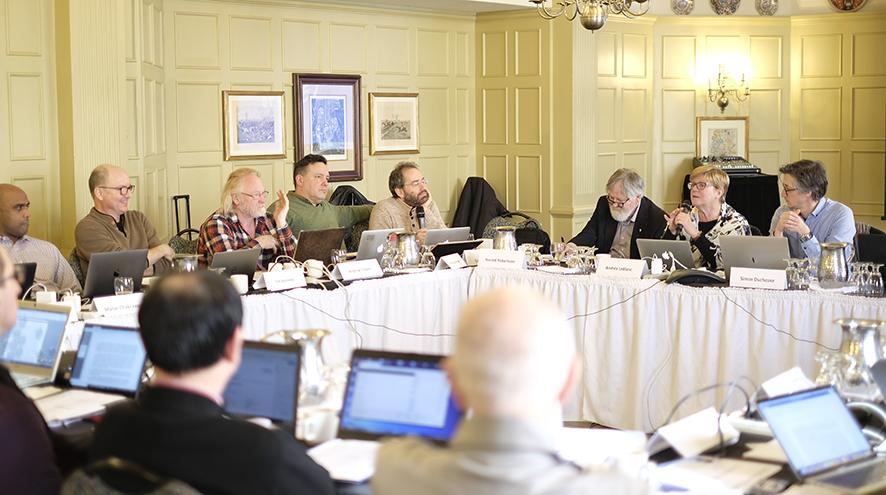How ASRP funding gets determined
In 2020, the Alzheimer Society Research Program received over 200 applications. Understand the process that determines which research projects among the final applicants receive funding.

Our Research Committees
We are grateful to those who volunteer their time and expertise on the following Alzheimer Society Research Program Committees.
ASRP Peer Review Panel
The Alzheimer Society Research Program (ASRP) relies on a system of peer review to identify the most promising research projects and ensure we make the best use of our research funding. Applications are evaluated on scientific merit and relevance to Alzheimer’s disease and other dementias by one of two peer review panels (i.e., biomedical or quality of life).
Research Policy Committee
The Research Policy Committee provides advisory oversight to the research efforts of the Alzheimer Society Research Program (ASRP) and makes recommendations to the Board of Directors as it relates to policy, strategy, priority setting, program effectiveness and funding.
Citizen Reviewers

“Very satisfying to participate in! Very informative and thought-provoking. The researchers were all very respectful of the Citizen Reviewers… Research is our only true hope for the future!” - Catherine Hoffsteter, care partner of a person living with dementia.
Citizen Reviewers are members of the general public who are not currently involved with research. They comment on the intent, purpose and on the clarity of the language used within the lay summaries of the research applications. Their involvement in peer review serves as a mechanism for public accountability by providing feedback on the ASRP peer review process.
ASRP evaluation process for research applications
Recruit Peer Review Panels
- Each chair (from the Biomedical and Quality of Life Peer Review Panels) will recommend reviewers based on their area(s) of expertise. Members will serve for a term of three years
Assignment of applications
- Applications are assigned to either the Quality of Life or Biomedical Panel based on the stream selected by the applicant
- A primary reviewer and secondary reviewer are then assigned to each application based on their area of expertise. In the event that additional expertise is required, an external reviewer will be contacted to provide an additional review
- In instances where conflict of interest is declared, applications are reassigned to a different reviewer
Review of applications
Each reviewer evaluates assigned applications by providing:
- A summary of the proposal and an assessment of the strengths and weaknesses in relation to ASRP criteria
- Comments on budget and comments on any matters that are flagged due to conflict with governing policies, or for other reasons
- A score between 0 and 4.9, where ratings of 3.5 or higher are considered to be within the fundable range
| Description | Range | Outcome |
| Outstanding | 4.5-4.9 | May be funded, will be discussed by the Peer Review Panel |
| Excellent | 4.0-4.4 | |
| Very good | 3.5-3.9 | |
| Acceptable, but low priority | 3.0-3.4 | Not fundable, may or may not be discussed by the Peer Review Panel |
| Needs revision | 2.5-2.9 | |
| Needs major revision | 2.0-2.4 | |
| Seriously flawed | 1.0-1.9 | |
| Rejected | 0-0.9 |
Peer Review Committee meeting
Each reviewer evaluates assigned applications:
- During this face-to-face meeting, individuals who are in conflict with the application being discussed leave the room
- Assigned reviewers announce their scores. Those applications that receive scores of less than 3.5 by both reviewers are eliminated at the discretion of the panel. Assessments are then presented by each reviewer, and where relevant, reviews from external reviewers are read by the Chair. The Chair then leads a discussion with the committee, and seeks a consensus score from the assigned reviewers
- All committee members then submit a confidential score for the application within +/- 0.5 of the average score of the two assigned reviewers and the average of the total scores is the final rating that will be assigned to the application
- Budget and term of funding are then discussed
- Notes are taken to record discussion of each application
Recommendation for funding/approval
Each reviewer evaluates assigned applications:
- The approved budget for the annual research competition is allocated to each application deemed fundable based on the assigned scores. Funding is applied from the top of the ranking list until expended
- The RPC makes a recommendation to the Board of Directors that the final list be funded. The Board of Directors then provides final approval
- Applicants are notified of the status of their applications by email. A list of successful grants and awards is posted on the ASC website
How research applications lead to outcomes
Applications
Successful applications selected for funding by the ASRP include research proposals which outline:
- Aims of the investigation
- Methods that will be used
- Hypotheses-Research Questions- i.e. population(s) studied, comparison group(s), intervention(s), outcomes(s)
Research process
Once funding commences, investigators carry out their research using the approved research design proposed in their applications, which generally involve the following:
- Testing hypothesis
- Observations
- Collection of data
Progress report
Every 12 months a progress report is required of the grant/award recipient affirming the aims and methods are the same in the investigation and providing an update on results attained to date. As per ASRP Application Guidelines, in the event that this report is not provided, funding may be revoked.
Final report
Within six months following the end of the grant/award, investigators are to submit a final report to the Alzheimer Society, outlining the final results of their investigation. Any papers submitted for publication, in press or published in peer-reviewed journals, which result from this funding, are to be provided at this time.
Knowledge Dissemination plan
All ASRP grant and award recipients must produce a Knowledge Dissemination method/tool as a way of sharing the results of their research with the public, in a way that is useful and easily understood. Examples include webinars, booklets, tools, workshops, and educational sessions with patients, practitioners or stakeholders that are to be completed and sent to the ASRP along with the final report. Also required are any research questions posed by the target audience in hope of informing future investigations.
Report forms for currently funded researchers
Fill out and submit your progress and final reports, as well as your conference evaluation form.

